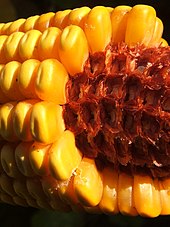Corncob
This article's tone or style may not reflect the encyclopedic tone used on Wikipedia. (August 2023) |

A corncob, also called corn cob or cob of corn, is the hard core of an ear of maize, bearing the kernels, made up of the chaff, woody ring, and pith. Corncobs contain mainly cellulose, hemicellulose, and lignin.[1]
However, during several instances of famine (especially in European countries throughout history), people have been known to eat the corncobs, especially the foamy middle part. The whole cob or just the middle used to be ground and mixed with whatever type of flour was available (usually wheat or corn flour). It served as a sort of peculiar "filler", to extend the quantity of the original flour and as such, it was used even in production of bread.[citation needed]
The cob is not toxic to humans and can be digested, but the outside is rough and practically inedible in its original form. The foamy part has a peculiar texture when mature and is completely bland, which most people would find unappealing, due to the consistency similar to foam plastic.
Corncobs are a particularly good source of heat when burned, so they were traditionally used for roasting meat on the spit, barbecuing and heating the bread ovens, through the centuries. In the olden days, it was especially appreciated for its long and steady burning embers, also used for the ember irons.[citation needed]

When harvesting corn, the corncob may be collected as part of the ear (necessary for corn on the cob), or instead may be left as part of the corn stover in the field.
Uses
[edit]Agricultural
[edit]- Bedding for animals — cobs absorb moisture and provide a compliant surface[2]
- Fiber in fodder for ruminant livestock (despite low nutritional value)
- Diluent/carrier/filler material in animal health products, agro-chemicals, veterinary formulations, vitamin premixes, pharmaceuticals, etc.[3]
- Soil conditioner, water retainer in horticulture[3]
Culinary
[edit]Corncobs are not frequently consumed after the corn has matured. Young ears of corn are harvested while the cob is still tender and are eaten whole. Baby corn is common in stir fries and Thai cuisine.[4] The cob can still be used for cooking, after the corn has matured:
Pest control
[edit]- Powdered corn cob is used as an environmentally-friendly rodenticide.
Industrial
[edit]- Industrial source of the chemical furfural[7]
- Absorbent media for safe disposal of liquid and solid effluents[3]
Other products
[edit]- Ground up and washed (then re-dried) to make cat litter
- A mild abrasive for cleaning building surfaces, when coarsely ground
- Bowl material for corncob pipes[8]
- As a biofuel[9]
- Charcoal production
- Anal hygiene[10]
- The body of a doll[11]
In media
[edit]Corncob TV is the fictional TV channel featured in Season 2, Episode 1 of I Think You Should Leave with Tim Robinson.[12]
References
[edit]- ^ Gandam, Pradeep Kumar; Chinta, Madhavi Latha; Gandham, A. Priyadarshini; Pabbathi, Ninian Prem Prashanth; Konakanchi, Srilekha; Bhavanam, Anjireddy; Atchuta, Srinivasa R.; Baadhe, Rama Raju; Bhatia, Ravi Kant (December 2022). "A New Insight into the Composition and Physical Characteristics of Corncob—Substantiating Its Potential for Tailored Biorefinery Objectives". Fermentation. 8 (12): 704. doi:10.3390/fermentation8120704. ISSN 2311-5637.
- ^ Aston, Andrew (November 14, 2010). "Bedding For Laboratory Animals". ALN Magazine. Archived from the original on September 27, 2015. Retrieved October 28, 2015.
- ^ a b c "Corn Cob Powder". www.rahiindustries.com.
- ^ Coelho, Steph. "Baby corn, explained: What it is and where it comes from". Business Insider. Retrieved 2024-08-09.
- ^ Hunt, Tom (2022-08-13). "How to turn spent corn cobs into stock – recipe". The Guardian. ISSN 0261-3077. Retrieved 2024-08-09.
- ^ Nguyen, Andrea (2023-09-21). "Vietnamese Corn Milk Recipe (Sua Bap)". Viet World Kitchen. Retrieved 2024-08-09.
- ^ Engineers, N.B.C. (2006). Wheat, Rice, Corn, Oat, Barley and Sorghum Processing Handbook (Cereal Food Technology). Asia Pacific Business Press. p. 173. ISBN 978-81-7833-002-0.
- ^ Tobacco Leaf. 1907. pp. 36, 38. Retrieved October 29, 2015.
- ^ Roth, Greg; Gustafson, Cole (January 31, 2014). "Corn Cobs for Biofuel Production". Cooperative Extension System. Archived from the original on September 10, 2015. Retrieved October 28, 2015.
- ^ Ruane, Michael E. (18 Mar 2020). "Toilet paper takes center stage amid coronavirus outbreak. Be thankful we no longer use corn cobs and rope ends". The Washington Post. Archived from the original on 2020-03-18. Retrieved 31 July 2021.
- ^ Zeltwanger, Alicia (2018-12-07). "Make Your Own Corn Cob Dolls DIY". Little House on the Prairie. Retrieved 2023-08-14.
- ^ "They said that to me at a dinner". I Think you Should Leave with Tim Robinson. July 2021. Netflix.
External links
[edit]
